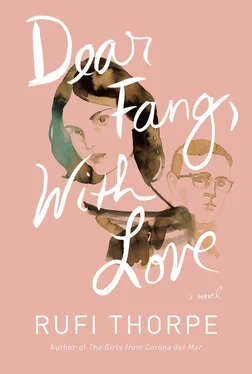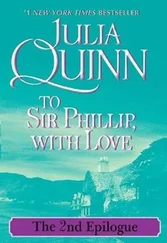“Why on earth would Fang tell you to read The Waves ?” I said. I had always staunchly defended The Waves in graduate school, but it was a weird book, and I did not particularly enjoy reading it, if I was being honest. It wasn’t even really a novel. Woolf had called it a “play poem” and it was a series of soliloquies from six different narrators who were not, Woolf maintained, separate characters per se but merely six facets of consciousness that were really continuous. It was slow and very poetic and opaque. The fact that Fang was recommending it was bizarre.
“He said it’s the best thing he’s ever read,” she said. “He said Virginia Woolf was the first European he had ever read who had spit out the lie of, you know, thinking we are all separate people.”
I hesitated. “But we are all separate people.”
“Well, but that could be an illusion,” she said. “Ants might think they are separate people, unaware that they act as a colony. Maybe humans only think they are separate, but really we might be like cells or bacteria, and collectively there might be a thing that is thinking, using us as, like, neurons.”
I sat down at the table. I wanted to get out the vodka, but I did not. The drinking had to stop, it just had to. I wanted my body back. Something in the sex with Susan had made me want that, to be a physical specimen again. To be frank and naked and unashamed of myself. Or maybe it had been meeting Herkus and seeing in him such an uncanny facsimile of a self I had already given up for lost. “Does Fang think there is no such thing as separate people?” I asked.
Vera squinted, looking up at the light, thinking. “Maybe not ‘no such thing’—like, that makes it sound like there are no individual ants, and of course there are — just more that what is actually interesting might be something we are unaware of about the way we are all connected. And he thinks that the idea of individuality is like a disease that has infected our culture. Basically.”
“Is this a Tongan thing?” I asked. “Or a Mormon thing?”
“I don’t think so,” she said. “I think it’s a Fang thing.”
“Why is Fang named Fang?” I asked suddenly. “I mean, is that his real name?”
“No. It’s because he can open a beer can with his teeth.”
I considered this for a moment. “Well, then, you should read The Waves. ” I held up my hands, shrugged. “It’s kinda boring, though. And she talks about the connectedness of people’s minds in the other books too. That’s what I was writing my dissertation on.”
“No shit? So you don’t think Fang is insane?” she asked, narrowing her eyes at me in a dramatic way that made it hard to take her seriously.
“No, why would I think that?”
“I just thought maybe you might,” she said.
“No,” I said.
“But you still think I’m insane,” she said.
“No,” I said, shaking my head. It was almost as though the past few days hadn’t happened for her. I was confused. She looked at me, searching for something. “I really don’t,” I said.
“All right,” she said, but I didn’t get the feeling it was settled in her mind.
“You told me you were on acid,” I said, trying to give her a replay of my understanding of our mutual reality. “And I believed you.”
“Oh, how great of you to ‘believe’ me,” she sneered.
“Well, Vera, what else am I supposed to do but believe you?”
That seemed to stop her. She shook her head. “I don’t know,” she said. A glass that had been on the counter suddenly fell to the floor and shattered. We both jumped as though someone had fired a gun.
“What the fuck!” she cried.
“I don’t know,” I said, “it must have been on the edge and then fallen.”
“Or there’s a ghost,” she said. I stood to sweep up the glass, telling her to stay sitting since her feet were bare. She propped them up on the table, her newly painted toes splayed, as I swept under her chair.
“There’s no ghost,” I said.
“Maybe it was Grandma Sylvia,” she said.
“Why would Grandma Sylvia be here? Wouldn’t her ghost be in California?”
“I don’t know,” she said. “I have no idea how ghosts work.”
“Well, I don’t believe in ghosts,” I said. But I had no explanation for why the glass might have fallen.
“I’m sorry I was so weird,” Vera said. “About believing me. That wasn’t fair of me.”
“That’s okay,” I said, down on my hands and knees with wet paper towels, trying to get the smaller shards.
“So you think I should read Mrs. Dalloway first?” Vera said, and it took me a minute to remember we had been talking about Woolf in the first place.
“Sure,” I said, crouched at her feet, holding the dirty wad of paper towels, still scanning the linoleum for shards. I had lost the thread. Nothing was making sense. Other people’s moods were changing too quickly for me to track. It was late and I needed to go to sleep.
“Justine called,” she said. “I told her we would skip out on our afternoon event tomorrow to go meet your family.”
“My family?”
“Yeah, I guess it’s Herkus’s cousin’s birthday or something. And everyone will be there, his mom, his aunt and uncle, like everybody. Big family gathering in the country.”
“And you didn’t lead with this news?” I said, as I struggled to stand and throw away the wad of paper towels. My body was stiff. I felt old. “This wasn’t the first thing you thought to say when I entered the room?”
“Ugh, Papa, not everything is about you,” she said. “The address is by the phone. I figure we can take a taxi.”
I nodded, feeling overwhelmed. I didn’t have a number for a taxi service. We would figure it out. Tomorrow was still an entire day away.
A bit later, she went to bed and I retreated to my room. I could hear her playing music in there on the tinny speakers of her laptop. Lady Gaga, it sounded like. I wanna take a ride on your disco stick. I thought about writing my mother, but didn’t. I should tell her about Herkus, but it felt like too much to explain, and I was exhausted even thinking about getting out my computer and typing it all.
I wondered about my mother. I wondered what it had been like to grow up as Grandma Sylvia’s daughter, what glasses might have shattered on that floor. The transition from forest fighter to housewife was perhaps only a smooth one in retrospect. I wondered what my mother hadn’t told me about growing up in that house, what things she had left out of her stories.
One of the things I had never told my mother was that I decided to find my father when I was living in New York. I had never told anyone, except Katya in one desperate letter sent after the fact. But since then, I had tried to contain it and keep it from spreading by not even thinking about it myself, as though it were a disease under quarantine. All these years, I had just sort of grown around it, the way skin will swallow up a splinter of glass.
It was the second winter I was in New York alone, and graduate school was already beginning to seem like a pointless exercise in pretension and one-upmanship. The loss of Vera seemed very final. My life was deeply hollow. I had been dating a girl named Crystal, but we had broken up and I was on a crash diet. Wrestling had done that to me, given me the bug of bulking up then starving myself to my lowest weight. That winter I survived on a diet of frozen chicken tenders, bowls of broth and hot sauce, and extra-large Diet Cokes. I knew my father was an actor. I thought maybe there was a chance he lived in New York. Most actors did, either there or LA. It was only because I was alone in the apartment too much that I even started thinking about it, decided to look him up. He had a pretty unusual last name, and when I looked in the white pages online, there were only five listings, and one of them was for an R.
Читать дальше












